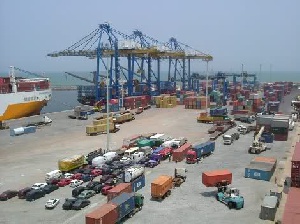The Ghana Institute of Freight Forwarders (GIIF) has called on the government to treat as serious its request to redefine the scope of the newly introduced Integrated Customs Management System (ICUMS) clearance platform.
The Ghana Revenue Authority (GRA) on June 1, 2020, permanently shut down the GCNet and Westblue systems which were replaced with ICUMS, amidst several complaints from freight forwarders and other users.
Over one week of its usage, GIFF at a press conference said they were sending a "save our souls (SOS)" message to the President and government to have a "relook" ICUM because it was a "confused system".
At a press conference in Tema, Mr Edward Akrong, President of GIFF, said, “This request to redefine the scope should be treated with all seriousness,” adding that “the government will have to carefully appraise this dire situation and advise itself on the choices to make going forward in this matter”.
Mr Akrong, touching on the challenges bedevilling the new clearance system, stated that a few hours after the deployment of ICUMS, it because inaccessible, adding however that hitch was remedied on that very first day.
He said another challenge was that the importer Tax Identification Number (TIN) could not be automatically populated to allow for the continual process of clearance explaining that “this is the basis for which one begins a declaration but unfortunately, it has been fraught with challenges till this day”.
According to GIFF, there was no benchmark for a delivery time, saying that ICUMS per the ‘Trade Facilitation Agreement with Ghana Link, ’ it had no Service Level Agreement (SLA) indicating process delivery times with which every other stakeholder could plan meaning declarations could get locked up in the system for weeks with no benchmark for redress.
They alleged that solutions to this issue had generally been on a ‘piecemeal’ approach leading to declarants having to approach the technical teams at the command centre for solutions.
The use of the new system, they said, had led to the use of manual processing, stressing that, “ICUMS, as we speak, has not been fully integrated with other players in the chain ie. Terminals, Shipping Lines, Ground Handlers and some Courier stations. This has led to the re-emergence of manual processes of release to our chagrin”.
Security-wise, GIFF stated that the back-end operations of one consolidator exposed the transactions of other consolidators in form and substance explaining that when consolidator ‘A’ logged into the system, they were able to see the operations of other consolidators in real-time.
“This is an anomaly because releases can intentionally or unintentionally be done for whatever effect. For a superior system of this sort, confidentiality is key”.
ICUMS, they noted, did not have administrative controls as they observed that the systems' log-in architecture stopped the administrator from having any oversight controls once a log-in credential had been created for the Assigns.
The Freight Forwarders indicated that there also existed system calculation challenges, stressing that “there seems to be a huge problem with the computation of figures in ICUMS, and of particular interest is that of vehicle declarations. We also have noticed a trend of Customs Validated Duty Declaration Documents with figures which defy reason.”
They said there were wrong applications of the exchange rate, non-application of required taxes, wrong application of taxes, and “bizarre computation of taxes”.
They also complained of the unavailability of a call centre to help users, saying “the constant trooping of our members to the command centre in search of solutions betrays the non-responsiveness of a functional call centre as we must have it”.
GIFF indicated that the manner in which information was managed in the system raised a lot of anxiety and nightmare for change management in the whole chain adding that training had been poorly managed, leading to fatigue amongst declarants.
"Follow up training sessions are popping up only a week after full deployment which only underscores our earlier observation of a not-so-well packaged delivery”.
Touching on the challenges experienced at the frontiers, they said, for the first 4 days of June, no import declaration went through at most of the frontier stations because they had to resort to manual interventions.
- Ghana Revenue Authority goes cashless at ports effective July 1
- Ghana Card allowed for customs processing on ICUMS
- GCNET ready to pay redundancy compensation to laid off workers
- ICUMS generates GH¢10.5 billion for GRA despite coronavirus impact on trade volumes
- GRA rakes in GH¢10.5 billion due to ICUMS roll out
- Read all related articles













